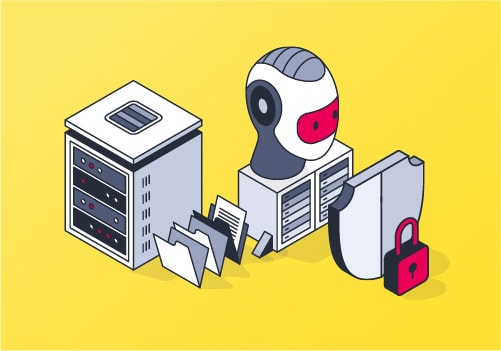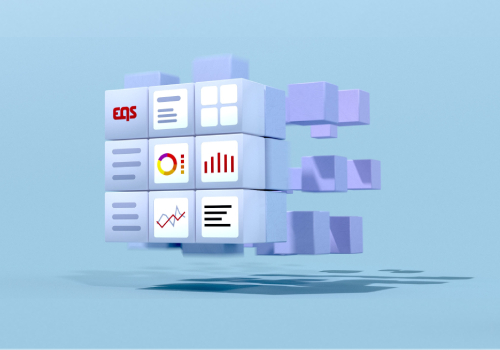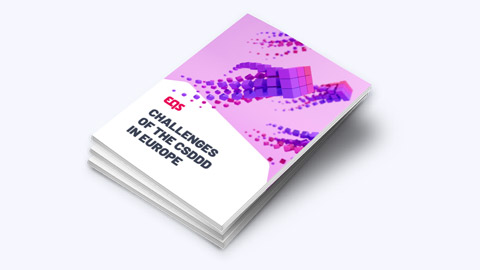How Artificial Intelligence is Revolutionizing Compliance Management
How is AI revolutionizing compliance? What risks should be considered? Our expert at EQS provides insights on the secure use of AI and its potential long-term impact on the future of compliance.

Artificial intelligence (AI) is transforming compliance management. It is making the work of compliance departments faster, more efficient, and significantly reducing workloads, resulting in substantial time savings. However, it is crucial not to overlook the potential risks associated with its use. Our expert Moritz Homann discusses the safe application of artificial intelligence at EQS and our commitment to shaping the future of compliance through AI integration.
Undeniable Advantages
Many of us have already encountered artificial intelligence in our personal and professional lives, and it is clear that groundbreaking opportunities lie ahead for companies in the coming years. AI offers increased speed, enhanced efficiency and time savings on complex tasks, complete with a reduction in human errors—all of which can significantly benefit compliance management in various ways.
AI in compliance can deliver a level of transparency and security that is unlikely to be achievable through manual efforts and spot checks. Given the rapidly changing regulatory landscape, the complexities of supply chain laws, and the pressures of limited staffing, compliance teams often find themselves stretched thin. Intelligent AI support can significantly alleviate the burden on compliance professionals, enabling them to focus on more strategic tasks.
Many compliance professionals are already leveraging artificial intelligence in their work. In our latest survey on “Compliance & AI,” over half of the 200+ respondents reported using AI tools regularly—either daily or at least weekly—for tasks such as data analysis, screening, and policy management support. More than 80% of respondents recognized the benefits of these AI tools. The rapid and thorough analyses, automation, and continuous monitoring that AI provides are indeed game changers in compliance management, significantly enhancing the role of compliance as a strategic business partner.
This is made possible by a single, integrated digital platform that brings together various processes and workflows, consolidating all compliance activities. Compliance teams can enhance their operational efficiency and concentrate on more critical tasks while benefiting from automated data analysis that supports strategic decision-making.
An integrated and user-friendly platform can measure and showcase the success and effectiveness of compliance initiatives, utilizing artificial intelligence, among other tools. AI within our EQS Compliance COCKPIT optimizes compliance processes by identifying opportunities for efficiency improvements and uncovering patterns that enhance overall performance.
How we Enhance Compliance Management with AI
Let’s explore the specific use cases supported by AI in the Compliance COCKPIT, designed to streamline our customers’ compliance processes and reduce employee workloads:
- Reduced Manual Workload
- AI Summaries: Many whistleblowers provide detailed reports. In the past, case managers had to write manual summaries, but now AI in the COCKPIT can efficiently handle this task. This update can save several hours of work each month, particularly for companies managing hundreds of reports.
- Transcription of Audio Notifications: Many organizations allow individuals to report concerns verbally, either through an answering machine or a call center. Previously, these conversations or messages were transcribed manually, but AI in the COCKPIT can now automate this process, enhancing efficiency.
- Detailed Analyses for Process Optimization
- Categorization of Reports: By categorizing reports related to fraud, corruption, or harassment, companies can unlock more precise analytical capabilities, facilitate the creation of year-end reports, and identify emerging trends. In the past, this categorization was often done manually, and as a result was often neglected due to heavy workloads. Manual categorization is also much more prone to errors. Now, AI automates this categorization process, further enhancing accuracy and efficiency.
- Fewer Breaches and Greater Acceptance Among Employees
- Answering Employee Questions: When compliance managers serve as the primary contact for inquiries about compliance guidelines, it can consume valuable time and resources, as many of these questions are often straightforward. With our AI tool, Policy Buddy, employees can now interact directly with an AI chatbot to ask their queries in a chat format. This not only provides quicker responses but also ensures the same level of reliable quality as answers from a compliance manager, available 24/7, as the chatbot references company guidelines and cites relevant passages in its responses.
- Never Miss a Deadline Again and Redact Personal Data in Seconds
- Redaction of Personal Data: By the time the legal deadline arrives, personal data must be either removed from documents or rendered unidentifiable. With the help of AI, this process can now be undertaken in just a few clicks. The technology automatically identifies relevant information, such as names and addresses, and blanks it out. What used to take hours of effort and frustration is now a task that can be accomplished in mere minutes.
Managing AI Risks Responsibly
Our AI features serve as smart assistants for compliance officers, but using them is entirely optional. We do not automatically activate the technology; instead, all our customers have the freedom to choose whether and which AI tools they wish to implement.
Of course, there are certain regulatory frameworks where the use of AI is not permitted. In such cases, our customers can utilize the COCKPIT in a “traditional” manner, without AI, and still benefit from automated workflows.
We also want to be mindful of compliance officers who do not currently wish to or are not permitted to use AI. In our latest survey, nearly 74% of compliance officers expressed concerns about employing AI tools in this area. This apprehension is understandable, as we at EQS recognize that every new technology comes with its own set of risks. Despite the excitement surrounding AI, it is only as reliable as the data it uses, and issues like hallucinations—where AI generates convincing yet false information—remain a significant challenge.
From the outset of integrating artificial intelligence into our Compliance COCKPIT, we have been clear: in such a sensitive area as compliance, mistakes are unacceptable. The content generated by AI must always be traceable, and the AI should never operate as a black box. To proactively address these risks, we utilize the strongest large language model available—the GPT model from OpenAI. We believe this model provides the highest quality responses at an impressive processing speed. Additionally, all AI-generated content is clearly labeled as such.
Top Priority: Data Protection and Data Security
Over 70% of survey respondents expressed significant concerns about data protection and confidentiality. At EQS, we take our customers’ worries about data security seriously and have developed a process that addresses these reservations:
- When utilizing an AI feature, only the truly relevant data is securely encrypted and sent to the GPT model.
- The data is never stored on a third-party server.
- The GPT model is hosted in France, ensuring that sensitive data remains within the EU.
This approach maximizes security while fully complying with the requirements of the EU AI Act.
What’s Next? From AI Advice to Integrating New Laws
We have a wealth of innovative ideas for AI features that we are developing in close collaboration with our customers, even if not all are ultimately implemented. We are primarily focusing on use cases that deliver genuine added value to compliance management by offering previously unavailable insights and enhancing the decision-making process for compliance officers.
Here’s a glimpse of potential innovations in the Compliance COCKPIT:
- In the future, when determining whether an employee’s second job poses a conflict of interest, an AI advisory service should be able to assist in the decision-making process. The AI will analyze similar past cases to provide guidance on how the current situation should be assessed, giving decision-makers increased confidence and significantly accelerating the processing time.
- Another scenario we are currently exploring is the integration of new regulations into the compliance program. Traditionally, new laws required manual checks for relevance, and existing company guidelines had to be revised or supplemented accordingly. In the future, AI will automate this process of verification and supplementation as needed.
While artificial intelligence will play a key role in our product development, our focus will never be on integrating AI for its own sake. Our primary goal is to assist compliance managers in their demanding day-to-day tasks with digital solutions—whether they involve AI or not. Many challenges cannot be addressed through AI alone and should continue to be tackled using traditional software and automation processes.






